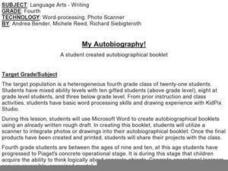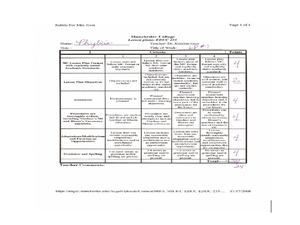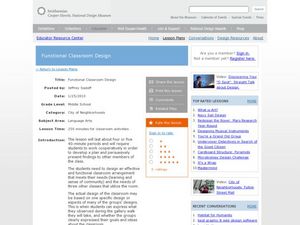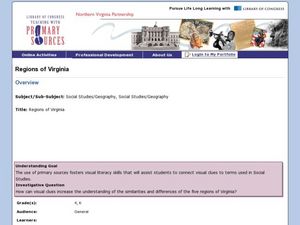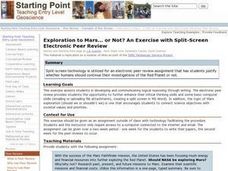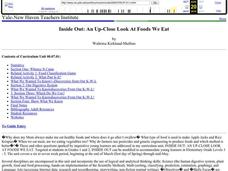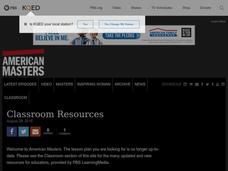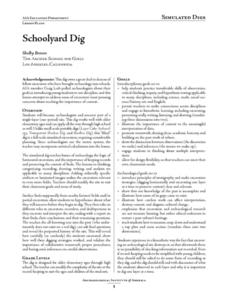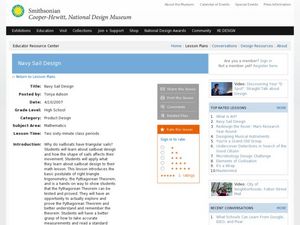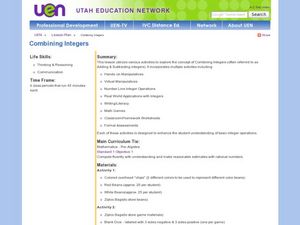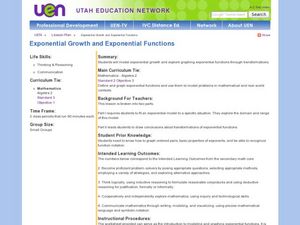Curated OER
Life Is a Journey
Students consider the literal and figurative definitions of the word journey. In this metaphor lesson plan, students discuss life journeys and their diversity.
Curated OER
Nursery Rhymes
Students recall details of nursery rhyme read by teacher, identify main characters, and demonstrate knowledge of poem by creating concept map about story that includes title, clip art, and changes in font and color.
Curated OER
My Autobiography!
Fourth graders create autobiographical bookets using an already written rough draft. Using illustrations, scanned photos, and word processing software, they type and print their booklet to share with their class.
Curated OER
Imagining Your Science Fiction Short Story
Twelfth graders brainstorm ideas for their own science fiction story. Using worksheets, they sketch the plot and setting for their story. They create appropriate characters and develop their interactions among each other. They share...
Curated OER
Trail Mix
Third graders, given the price of different ingredients, make a trail mix of five different items without exceeding their budget of five dollars. They choose between pretzels, M&M's, twizzlers, popcorn, etc,. Each student practices...
Curated OER
When Jessie Came Across The Sea
Students engage in a study about immigration by using children's literature. They conduct research about the immigrations to New York City in the past and the current status. Students conduct class discussion about Ellis Island and what...
Curated OER
Probably Passage (Predicting)
Third graders practice predicting. In this prediction lesson plan, 3rd graders read a worksheet and they predict where 15 words will fit into the story. After they read the story, they discuss the similarities and differences between...
Curated OER
The Strength of the Muscular System
Seventh graders investigate the strength of the muscular system. They explore voluntary and involuntary muscle movement and discuss the types of muscles: cardiac or heart, skeletal, and smooth. They visit stations to answer questions...
Curated OER
Leonardo the Genius
In this artists history worksheet, students read an excerpt about Leonardo Da Vinci. They suggest what natural abilities, attitudes, and personal characteristics he would have needed to do all the famous works that he painted. Students...
Curated OER
Functional Classroom Design
Students work in groups to design an effective and functional classroom. In this classroom design lesson, students discuss community and make a mental map and sketch of their classroom. Students complete a handout about the design...
Curated OER
Researching Plant Life
Fourth graders examine the process of photosynthesis. Given websites about plant life, 4th graders retrieve and record accurate information about the parts of the plant and photosynthesis. Students solve a "Plant Life Mystery" from...
Curated OER
Regions of Virginia
Fourth graders research an assigned region of Virginia. They work in groups to create a PowerPoint presentation. They present their information to the class. Students are tested on the information from their region as well as the regions...
Curated OER
Exploration to Mars... or Not? An Exercise with Split-Screen Electronic Peer Review
Students use split-screen technology which is utilized for an electronic peer review assignment that has students justify whether humans should continue their investigations of the Red Planet or not.
Curated OER
Travels With Charley
Fifth graders engage in a literature study that uses a variety of texts in order to maximize their exposure to different reading situations. They examine each book in order to practice skills of reading comprehension. They recognize the...
Curated OER
It Counts
Learners explore how numbers can identify objects. In this math lesson plan, students determine how numbers are used to describe objects used in quantitative data collection.
Curated OER
Inside Out: An Up-Close Look At Foods We Eat
Fourth graders identify the origins of meats and vegetables consumed by humans on a daily basis. They classify foods (meats, dairy products, grains...) and create a food pyramid.
Curated OER
Stadium Voices
Students watch NEW YORK VOICES special "New York Sports: Big Shots and Bad Guys," read excerpts from famous novels/essays in hopes of understanding the feelings that sports stadiums inspire, and create a tourist brochure that highlights...
Curated OER
Designing Another Juilliard
Students investigate the vision and history of the Juilliard School. They develop a personal mission statement, watch a video, conduct Internet research, and create a PowerPoint presentation about a fictional school that also promotes...
Curated OER
Schoolyard Dig
Learners begin the lesson plan by being introduced to the new vocabulary associated with archaeology. In groups, they use the school grounds to simulate their dig site. They record all the objects they discover and what can be gathered...
Curated OER
Navy Sail Design
Learners use the Pythagorean Theorem to explore sailboat design. In this Pythagorean Theorem lesson, two sides of a triangular sail are measured, and the theorem is used to calculate the third side. A worksheet, bulletin board design,...
Curated OER
Combining Integers
Seventh graders explore the concept of adding and subtracting integers. In this adding and subtracting integers lesson, 7th graders use white and red beans to demonstrate adding and subtracting integers. Students play an on-line game...
Curated OER
Exponential Growth and Exponential Functions
Pupils explore the concept of exponential functions. In this exponential functions lesson, students model exponential growth about a high school population using an applet. Pupils manipulate the applet to show the effect that a change in...
Curated OER
Understanding Justice, Kindness and Tolerance
Ninth graders consider the implications of racism and prejudice. In this character education lesson, 9th graders participate in a classroom activity that requires them to consider how self-deception and self-betrayal contribute to racism.
Curated OER
Multiple Intelligences
Students investigate Gardner's theory of multiple intelligences. For this research based lesson, students compare theories of intelligences and examine the implications of using these theories in schools and society.




